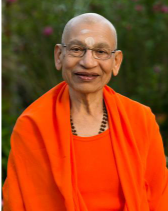
Spirituality: Anger And Greed

By Swami Viditātmānand Saraswati*
Krodha and Lobha (Anger and Greed): Anger and greed are both impulses. When they take over the mind, one loses his senses/mind.
Therefore, Bhagavān said: क्र ोधाद्भवति संमोहः Delusion and indiscretion are born due to anger (and also greed) and that means a person’s outlook is distorted. He does not see what it is and he superimposes what it is not. He sees adharma where there is dharma and where there is adharma, he sees dharma.
संमोहात्स्मृतितवभ्रमः Loss of memory results from delusion. Memory means discriminative intellect, wisdom, saṁskāra – past experiences which are generally useful in making decisions are not available due to delusion and are not available to use.
स्मृतिभ्रंशाद् बुद्धिनाश: The intellect becomes incapacitated due to loss of memory, which means the power to decide what is to be done and what is not to be done is lost; and, whatever a decision one takes or action one performs is not appropriate to his or her status. When one comes to his senses, he definitely feels regrets but the damage has already been done. Under the impulse of anger or greed, one hurts the self or others. If this type of behaviour continues, ultimately the person is destroyed, meaning, he loses the capacity for achieving something in life or the welfare of life.
Here Arjuna got the answer to his question: Kāma (desire) that results in anger or greed makes one helpless and makes him commit sins.
Also read: Spiritual Discourse: Desire, Greed and Anger
The event of sītāharaṇa in Rāmāyaṇa depicts this entire process. Rāvaṇa is a symbol of kāma. He has ten heads. This kāma resides in five jñānendriyas and five karmendriyas and it hijacks the mind by fascinating the mind to the sense objects. In Rāmāyaṇa, Rāvaṇa decided to kidnap Sītājī and asked help from his maternal uncle Mārīca for that. Mārīca tried to convince Rāvaṇa but he did not agree and by giving in to the threats of Rāvaṇa, he agreed to cooperate. Mārīca transformed into a golden deer and started to walk in front of the leaf hut where Sītājī was sitting.
As soon as Sītājī would see the deer, it would disappear. In this way, Sītājī saw it frequently. She started pondering upon the golden deer. When a thought comes across the mind, it does not bring about any effect; however, if the same thought keeps coming up again and again, it becomes dominant. Here also, Mārīca frequently came across Sītājī and therefore, Sītājī got attached to it.
This deer is beautiful, how nice it would be to have it with me? Then, that attachment turned into an intense desire – I have to have it, I cannot live without it.
Sītājī expressed her desire to Rāmacandrajī. Rāmacandrajī tried very hard to convince Sītājī that a deer cannot be made of gold, we are in the land of rākṣasas and this seems to be a phantasm/illusion of some rākṣasas, so not to get confused. However, Sītājī did not listen to him.
Similarly, the objects of the world seem attractive like the golden deer and attract the mind of a person. Once the attraction is there, he does not think about whether the happiness that he sees in the objects is real or not. When Sītājī did not agree with Rāmacandrajī, he was compelled to follow the deer. He left Lakṣmaṇaji to protect Sītājī and asked him not to go anywhere leaving Sītājī behind. Here, as preplanned, the golden deer took Rāmacandrajī far away and in the end, fell injured with Rāmajī’s arrow.
He came back to his real form of rākṣasa. While dying, he shouted in the voice of Rāmacandrajī ‘O Lakṣmaṇa, O Sītā. Sītā was shocked to hear this in the leaf hut. She was afraid that Rāmacandrajī must be trapped in some great adversity. She instructed Lakṣmaṇaji to leave immediately to help Rāmacandrajī. Again, Lakṣmaṇaji explains to Sītājī that this can also be a phantasm of some rākṣasa. There is no one in the world who can hurt Rāmacandrajī. However, Sītājī did not listen.
कामात्क्रोधोऽभिजायते – Desire now converted into anger. From there, delusion and from delusion, loss of memory. Sītājī lost her senses and started saying what should not be said doubting the intentions of Lakṣmaṇa. Lakṣmaṇa had no choice but to go after Rāmacandrajī. The discrimination in the form of Lakṣmaṇa left and now desire prevailed; the peace, focus and happiness of Sītājī’s mind got kidnapped.
बुद्धिनाशात्प्रणश्यति: Bhagavān says kāma eṣa, krodha eṣaḥ – this desire and this anger bring about all of the devastations and make us commit sin even when we do not want to. That is mahāśana, a voracious, glutton, whose hunger is never satiated. Also, Bhagavān compares desire with that fire which can be put out with great effort. When the oblation of ghee is done in fire, instead of being put out, the fire ignites even more, similarly, desire becomes more and more intense as it is satisfied. Bhartṛharī says: તૃष्णा न जीर्णा वयमेव जीर्णा: We age, but our cravings do not. A person ages, his organs weaken, and there is no strength to even walk, even then the desires, and cravings are not leaving him.
रजोगुणसमुद्भवः Desire is born out of rajoguna. Only when there is the dominance of rajoguna in our mind, the worldly objects and individuals etc. can generate enjoyership. Thus, from rajoguna, desires are produced and desires create rajoguna also. That means, after getting created, the desire makes one perform the action, it compels him to perform karma. Bhagavān said the same thing earlier: कार्यते ह्यवश: Prakṛti compels the living beings to perform the action.
As the cravings become intense, the discrimination fades away. The impulses of desires, anger, and greed born at that time make one perform actions that are inappropriate for him. Mahāpāpmā – desires, anger and greed are big sinners, they are the root cause of all the sins. If you look into the root cause of the sins committed wherever, and whatever sins they may be, you will find only desire, anger and greed as the cause. Greed is the root of most of the theft, immorality and corruption. It is understandable if a person steals when he is hungry, helpless and has nothing in his possession; however, most of the theft is committed by those who have enough or ample. What is the cause of this? Greed. And the reason behind injustice, atrocities and violence is desire.
Thus, desire, anger and greed are indeed great sinners, a person is not a sinner. Therefore, there is a chanting rite for atonement in Veda – कामोऽकार्षित ् मन्युर कार्षित ् – Desire did this, anger did this, I didn’t do it. The Bible also says that hate the sin, not the sinner because the sinner is helpless. In the description of divine qualities in the 16th chapter of Bhagavad Gītā, desire, anger and greed are called the door to hell. Bhagavān says, “Arjuna, this desire is your enemy.”
Thus, Bhagavad Gītā is śāstra to conquer the internal enemy in the form of desire. In the 6th chapter, Bhagavān says that the mind is the friend of a person and it indeed can be the enemy.
The mind that is possessed by desire, anger etc. impulses is the enemy of a person and that mind which is free from such impulses is convenient to him and under his control is the friend. Such a mind is a companion and a means for spiritual and also material advancement. Earlier it was said that Kaṭhopaniṣad also beautifully describes the chariot in the form of the human body: Think of jīvātmā as the owner of a chariot, the body is the chariot, intellect is the charioteer and the mind is in place of rein, senses in place of horses and the path of the chariot is the sense object.
*Swami Viditatmananda Saraswati has been teaching Vedānta Prasthānatrayī and Prakaraṇagranthas for the last 40 years in Ahmedabad, Gujarat. Throughout the year, he conducts daily Vedānta discourses, accompanied by retreats, and Jñāna Yajñas on Vedānta in different cities in India and in foreign countries.






We are very thankful to you for spreading the janam among the seekers by publishing spiritual articles in your esteemed news portal.
Thank you.
Great piece
Worth reading